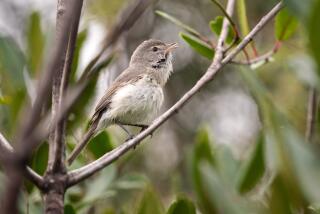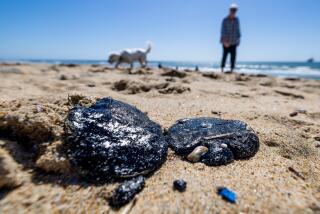Rescuing Oil Spill Victims, Bird by Bird : Environment: Private groups assist Fish and Game at minor disaster in Upper Newport Bay Ecological Reserve. Authorities still don’t know who did the dumping.
- Share via
NEWPORT BEACH — The word traveled downstream by radio: Another sick bird had been found near Upper Newport Bay.
A rescue boat emerged through the salt marshes, and a worker handed Mimi Wood-Harris a rumpled white pillowcase that she cradled in her lap en route to a makeshift rescue station.
Inside the pillowcase lay an eared grebe, still alive but sluggish from a small but toxic oil spill that sent a dangerous sheen this week into the bird-rich waters of the Upper Newport Bay Ecological Reserve.
Rescue workers blame the spill on “midnight dumping” of about 100 gallons of waste motor oil into a storm drain upstream. All day Wednesday, as state Fish and Game workers shuttled these small white bundles of wildlife out of the salt marshes, they talked with restrained but unmistakable anger about such dumping.
What makes the spill particularly vexing for wildlife officials is that although it involved so little oil--enough to fill about three bathtubs--it still made its way into the reserve and proved toxic to bird life.
In her animal rescue work, Wood-Harris has seen much larger environmental tragedies than the one that hit Newport Bay this week. The wildlife toll remains unknown, but as of Wednesday workers had found three birds dead and eight others sickened.
Wood-Harris spent 3 1/2 months in Alaska in 1989, aiding birds in the wake of the Exxon Valdez oil spill. But while this week’s spill was relatively small, she said, it occurred precariously close to the sensitive ecological reserve.
“It was maliciously done,” said Wood-Harris, the Southern California regional representative for the International Bird Rescue Research Center, a nonprofit group. “People should not just dump their oil. It causes devastation.”
Oil was barely visible on the black-feathered American coot that a rescue worker brought to a bay-side state Fish and Game Department office in Newport Beach.
But when Wood-Harris brushed the feathers on the bird’s neck, they clumped unnaturally. And the bird was acting unusually listless, she said. The fact that rescue workers could catch these birds suggests that they are weakened, she said.
“These guys can run like nobody’s business,” said Wood-Harris, watching the coot closely. “He’s ingested it, and he’s weak.”
She gently held the coot while inserting a tube into its mouth and down its throat, feeding the bird a fluid called Pedialyte to restore liquids and fight dehydration. Then she placed it in a cardboard box that once held apples. The birds will be transported to an animal care center where they will be treated and monitored for four to 10 days.
Rescue workers spent hours Wednesday patrolling the state ecological reserve in a small motorboat, studying some of the thousands of birds that live and feed here.
Reserve manager Troy D. Kelly stood at the boat’s prow, looking over the shallow waters and mud flats that makes the bay one of Orange County’s most ecologically valuable wetlands for native and migrating birds.
“We’re part of the Pacific Flyway, and this is a refueling stop,” said Kelly, who could not remember another similar oil spill occurring at the ecological reserve.
The wildlife experts pointed out one brown pelican perched on a pole appeared to have an unnaturally dark chest. And when the boat passed a great egret at the water’s edge, the bird’s wings seemed to droop.
Whether oil was the culprit, wildlife experts could not say for sure. But they noted that the effects of an oil spill are often not known for several days--not until birds are found dead or are too weak to run away from approaching rescuers.
“Birds don’t sit on the beach and say, ‘Hey, come get me,’ ” said Wood-Harris, whose agency is working for Fish and Game at Newport Bay.
Cleanup workers have installed booms across the Delhi Channel, and cleanup and rescue efforts are expected to be completed later this week, officials said.
So far, no major damage is anticipated for the light-footed clapper rail, a federal endangered bird for which Upper Newport Bay is well known. Only 262 pairs of the bird were counted in the United States last spring. More than 90% of the species’ breeding pairs are found in only three spots--including Newport Bay and the Seal Beach National Wildlife Refuge locally.
On Wednesday, officials were still trying to piece together details of how the spill occurred.
They said it appeared someone dumped the oil into a storm drain behind a commercial plaza in the 300 block of South Bristol Street. Three 55-gallon drums were found at the site Monday.
The Department of Fish and Game is asking anyone with information about the dumping to contact the department at (800) 952-5400.
More to Read
Sign up for Essential California
The most important California stories and recommendations in your inbox every morning.
You may occasionally receive promotional content from the Los Angeles Times.













